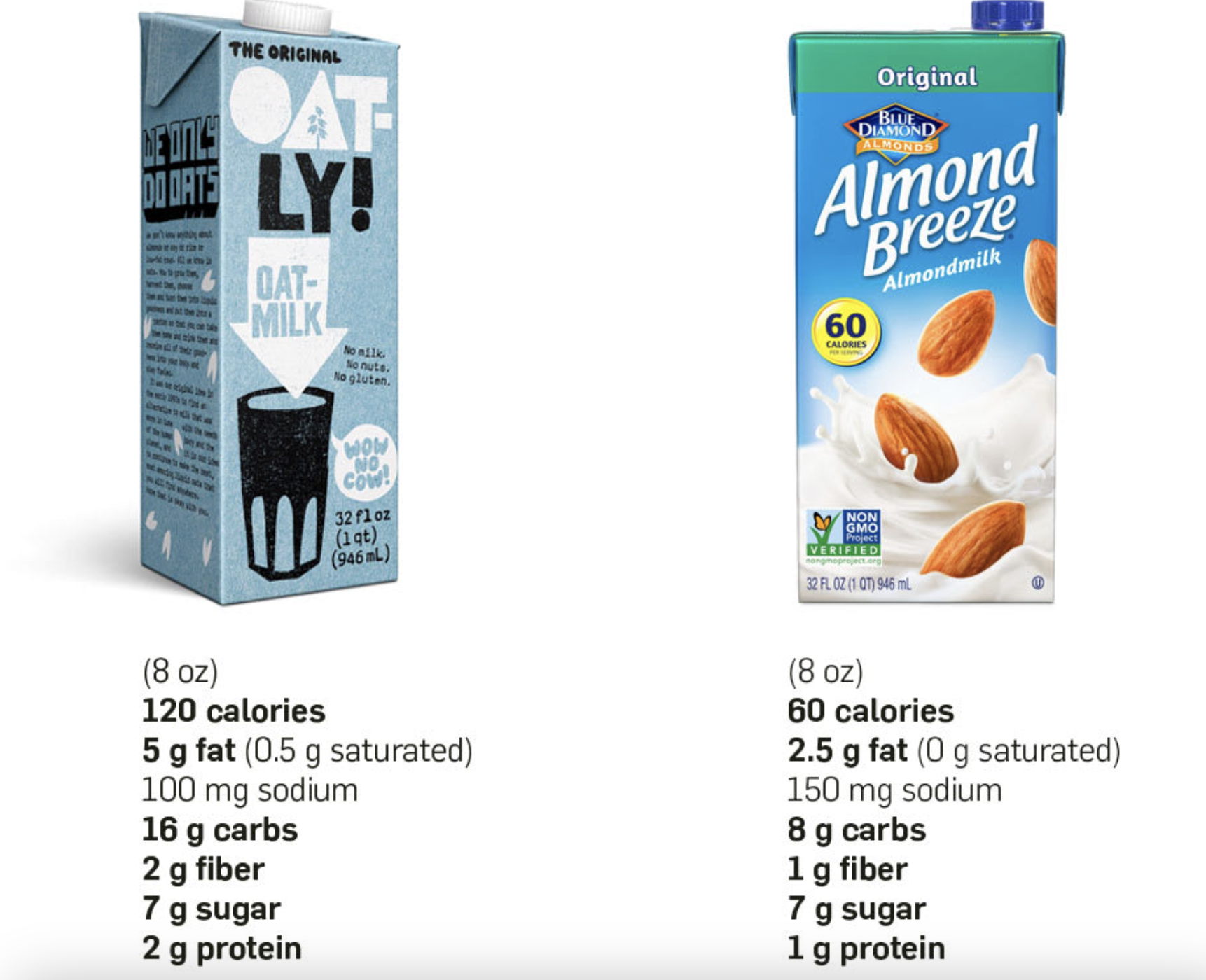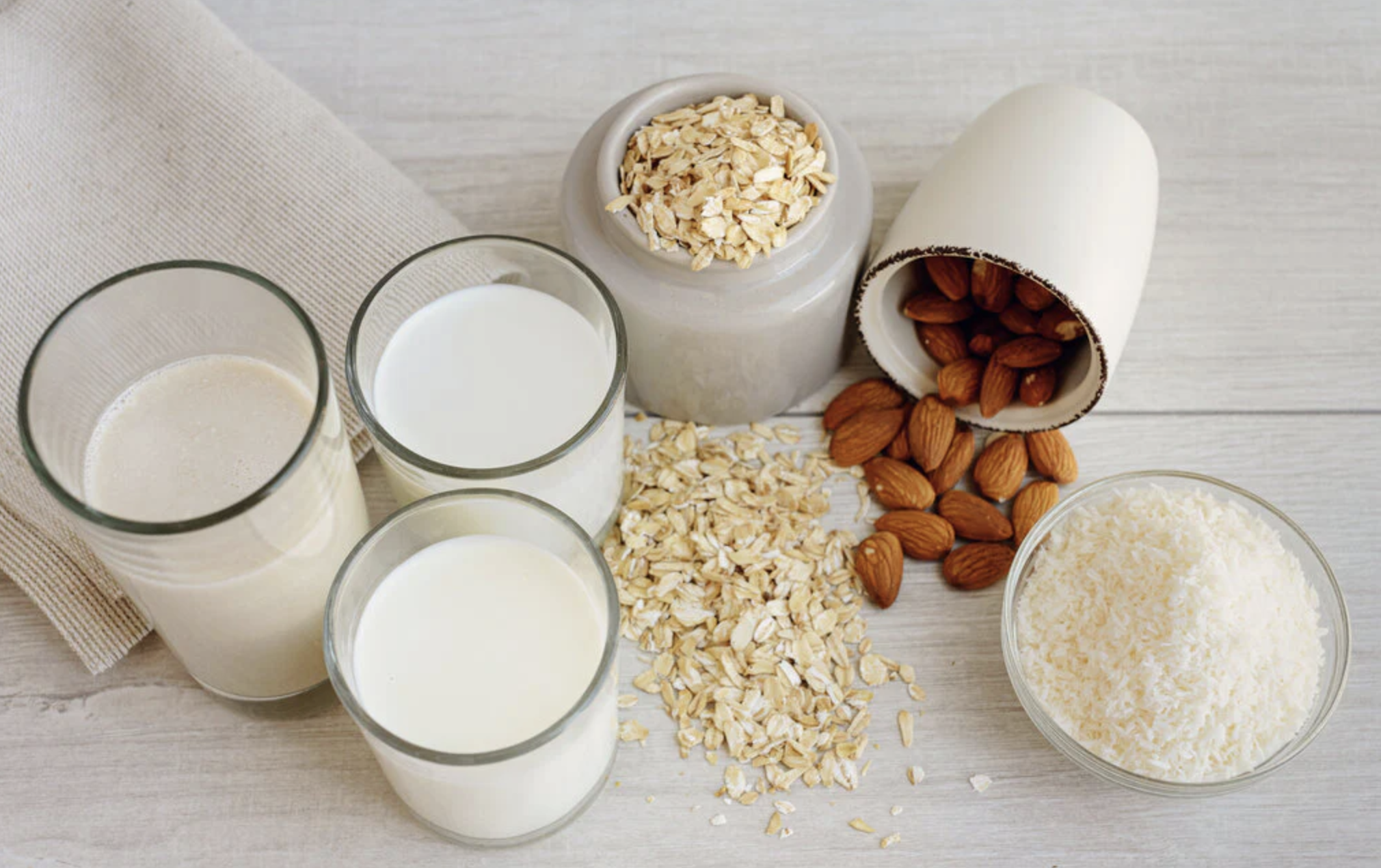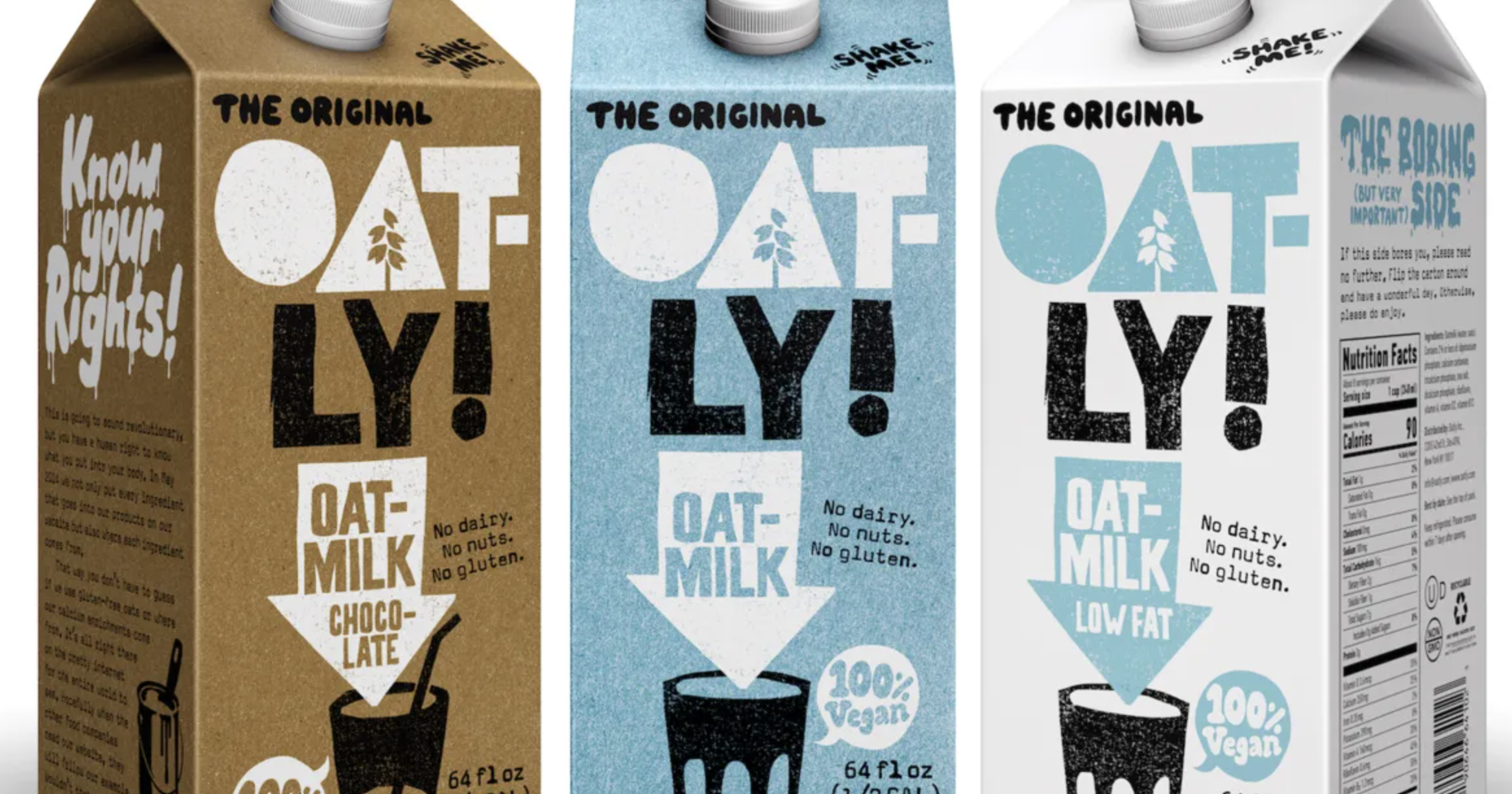Oatly vs. Almond Milk: Which Plant-Based Milk Reigns Supreme?
Embark on an epic exploration as we pit Oatly against Almond Milk in the ultimate plant-based milk showdown. This guide promises a thrilling journey into the world of dairy alternatives. Read on, the battle begins!

Nutritional Value and Health Benefits
Oatly, crafted from oats, is a standout for its rich and creamy consistency. Its oat base not only imparts a satisfying texture but is also a powerhouse of nutrition, particularly fiber. This dietary fiber is essential for digestive health and adds to the feeling of fullness, making Oatly a substantial choice for those seeking satiety in their beverages.
Additionally, Oatly is packed with beta-glucans, a type of soluble fiber recognized for its role in improving heart health and aiding in cholesterol management. This makes it a heart-friendly alternative to traditional dairy milk.
Switching focus to Almond Milk, this option shines for its lower caloric and carbohydrate content. It's an ideal pick for individuals monitoring their calorie intake or managing carbohydrate consumption.
Almond Milk is not just about what it lacks; it's also a valuable source of vitamin E, an antioxidant vital for cell protection and skin health. This nutrient plays a crucial role in combating oxidative stress and supporting overall wellness.
Both Oatly and Almond Milk contribute beneficial nutrients that cater to different health goals and dietary preferences. While Oatly offers the heart-healthy benefits of beta-glucans and a fiber-rich profile, Almond Milk appeals to those seeking a lower-calorie option rich in antioxidants.
This diversity in nutritional benefits underscores the importance of choosing a plant-based milk that aligns with individual health objectives and nutritional needs.

Environmental Impact and Sustainability
The sustainability of our food choices has never been more critical, and this is where the comparison between Oatly and Almond Milk becomes particularly interesting. Oatly's commitment to environmental stewardship is evident through its innovative approaches to reduce its ecological footprint.
The cultivation of oats, the primary ingredient in Oatly, is notably less demanding on water resources than the almond trees required for Almond Milk. This significant difference in water usage is a key factor in Oatly's favor, as it addresses the pressing global issue of water scarcity.
Furthermore, Oatly has integrated renewable energy into its production processes, showcasing a proactive approach to minimizing carbon emissions. This initiative not only aligns with broader environmental sustainability goals but also sets a commendable example for other companies in the industry.
Almond Milk, while offering its own set of benefits, faces challenges related to sustainability. The almond industry is heavily scrutinized for its water-intensive nature, which is exacerbated by the fact that many almond farms are located in regions already facing water shortages.
Additionally, the reliance on bee pollination for almond trees has raised concerns about the impact on bee populations, a critical component of our ecosystem's biodiversity. Despite these challenges, it's important to note that some brands of Almond Milk are taking steps to mitigate these issues through improved water management practices and support for bee conservation efforts.
The sustainability debate between Oatly and Almond Milk underscores the importance of considering environmental impacts in our dietary choices. It highlights the need for ongoing efforts to enhance the sustainability of plant-based milk options, ensuring they contribute positively to our planet's health.

Taste and Versatility in Cooking
Oatly's texture is notably creamy, offering a unique richness that lends itself well to a variety of culinary applications, from smoothies to creamy soups. Its slightly sweet undertone enhances the flavor of beverages such as coffee and tea, making it a favorite among those who prefer their plant-based milks to add a touch of sweetness to their drinks.
Additionally, Oatly's ability to froth well is a boon for coffee aficionados looking to replicate café-style lattes and cappuccinos at home, adding a barista-quality finish to homemade coffee creations.
Almond Milk, with its nutty essence and lighter consistency, is a versatile ingredient in the kitchen. It's especially favored in baking, where its subtle flavor can complement other ingredients without overwhelming them.
Almond Milk can be easily incorporated into savory dishes as well, providing a dairy-free option for creamy sauces and soups that require a thinner consistency. Its neutral taste profile makes it an adaptable component in both sweet and savory recipes, ensuring that it doesn't alter the intended flavors of the dish.
Both Oatly and Almond Milk bring distinctive qualities to the table, making them suitable for a range of cooking and baking needs. Whether used for their flavor-enhancing properties or their adaptability in recipes, these plant-based milks demonstrate the culinary flexibility that makes them valuable additions to any kitchen.
Cost and Availability
Navigating the aisles for plant-based milk options, consumers will find differences in cost and availability between Oatly and Almond Milk. Generally, Almond Milk emerges as the more budget-friendly option, with a wide array of brands and flavors populating supermarket shelves.
Its longstanding presence in the market has contributed to its affordability and accessibility, making it a go-to choice for many seeking plant-based alternatives.
On the other side, Oatly presents a slightly higher price point, attributed to its premium formulation and the innovative processes involved in its production. Despite this, the brand has experienced a surge in demand, propelled by its unique taste profile and environmental initiatives.
This growing popularity has led to improved availability, with Oatly products now more likely to be found in both conventional and health food stores alike. Nevertheless, some regions may still experience limited access to Oatly, especially when compared to the ubiquitous presence of Almond Milk.
For shoppers, the choice between Oatly and Almond Milk might also be influenced by promotional offers and store-specific discounts, which can make Oatly more competitively priced at times. As the market for plant-based milks continues to expand, the landscape of cost and availability is ever-changing, encouraging consumers to stay informed about their options.
Whether prioritizing price, nutritional content, or environmental impact, the decision between these two plant-based milks requires consideration of various factors beyond just the sticker price.

Dietary Restrictions and Allergens
Navigating dietary restrictions and managing allergies is a critical concern for many consumers, and plant-based milks like Oatly and Almond Milk offer valuable alternatives.
Oatly is particularly suitable for a wide audience, including those who avoid dairy due to lactose intolerance or ethical reasons, and individuals with soy or nut allergies looking for safe options. Its formulation excludes common allergens, providing a safe haven for consumers who often find their choices limited by dietary constraints.
On the flip side, Almond Milk is a staple in the dairy-free community, favored by vegans and those with lactose intolerance for its smooth texture and nutritional profile.
However, it's essential to highlight that Almond Milk is derived from nuts, posing a potential allergen for individuals with sensitivities to tree nuts. Those with nut allergies need to steer clear of Almond Milk, turning instead to other nut-free alternatives like Oatly.
In the context of gluten sensitivities, it's crucial for consumers to verify that the oat milk they choose, such as Oatly, is labeled gluten-free. While oats naturally do not contain gluten, they can be cross-contaminated with gluten-containing grains during processing.
Hence, checking for a gluten-free certification is important for individuals with celiac disease or gluten intolerance ensuring their dietary needs are met without compromising their health.
Ultimately, the choice between Oatly and Almond Milk should consider individual dietary needs and allergen sensitivities. Both options cater to the dairy-free community, yet their suitability varies based on specific allergies and dietary restrictions, emphasizing the importance of informed choices in maintaining health and well-being.

Brand and Ethical Considerations
In the arena of brand and ethical considerations, the distinctions between Oatly and Almond Milk brands spotlight their respective pledges to not only offer nutritional benefits but also to uphold sustainable and ethical standards.
Oatly’s approach is marked by an openness regarding its carbon footprint and a dedication to minimizing environmental impact, demonstrating a commendable level of corporate responsibility. This transparency allows consumers to make informed decisions based on not just product quality but also environmental stewardship.
On the other hand, several Almond Milk producers are making concerted efforts to address the environmental and ethical challenges inherent in almond production. These include adopting water conservation techniques and engaging in practices that support the health of bee populations, which are vital for almond tree pollination.
The commitment by these brands to mitigate adverse environmental effects shows a growing awareness and responsiveness to sustainability issues within the almond milk industry.
For consumers, the choice between Oatly and Almond Milk might extend beyond mere preference for taste or nutritional content. It encompasses a broader consideration of how their purchases can align with personal values related to environmental conservation, animal welfare, and social responsibility.
The increasing focus on sustainability and ethical practices by both Oatly and Almond Milk brands reflects a positive shift towards more conscientious consumption. As these brands continue to innovate and address ethical challenges, they empower consumers to make choices that not only benefit their health but also contribute to the well-being of our planet.
You May Also Like:






